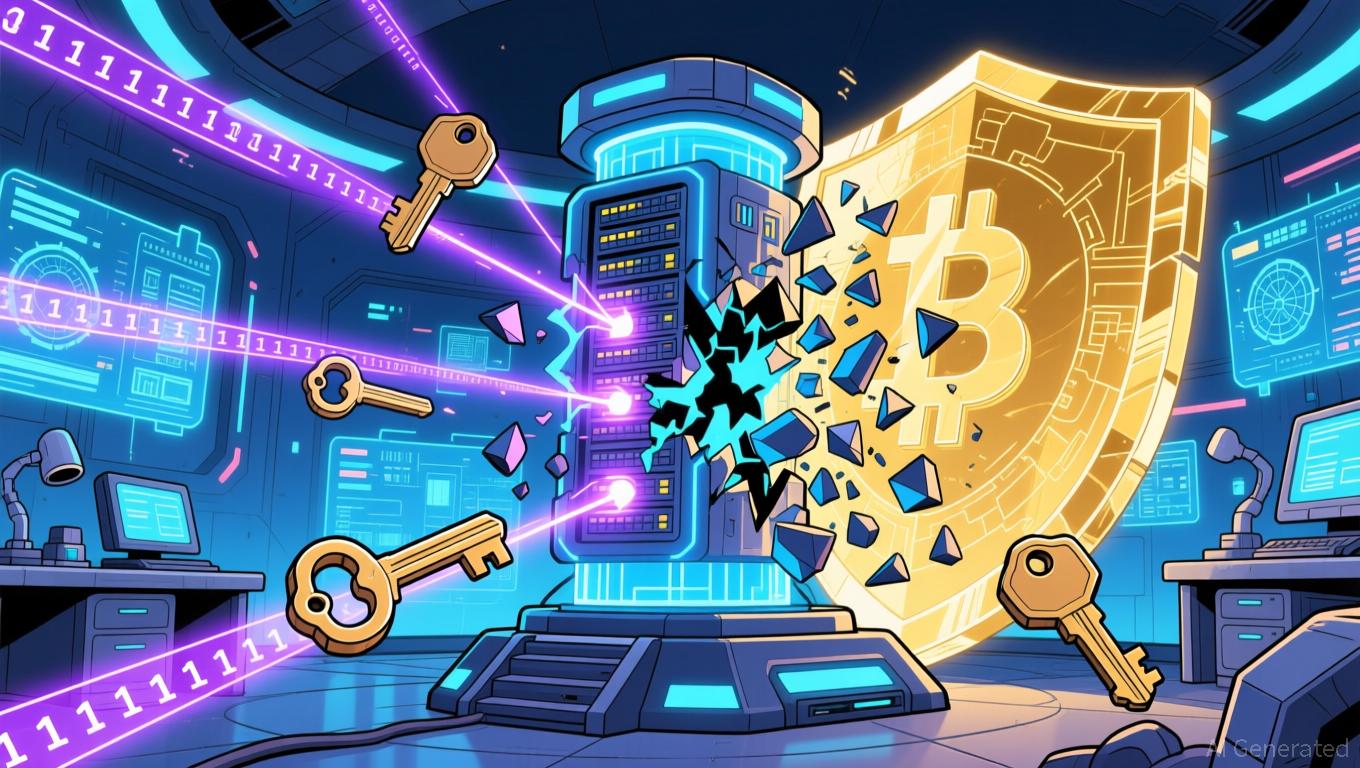Buterin: Quantum Computing May Undermine Confidence in Crypto by 2028
- Ethereum co-founder Vitalik Buterin warns quantum computing could break Bitcoin/Ethereum's ECC security by 2028, enabling private key theft. - Quantum-resistant cryptography migration is urgent as tech giants advance 1000s-qubit systems, with ECC-breaking machines expected by 2030. - Industry faces dual challenges: developing post-quantum algorithms while maintaining blockchain functionality during complex decentralized upgrades. - Buterin urges accelerated global collaboration, highlighting that delayed
Vitalik Buterin, one of the founders of
This urgency is fueled by the rapid progress in quantum computing technology. Leading companies such as Google, IBM, and research teams in China are already building quantum processors with thousands of qubits, which are the fundamental units of quantum computation.

Blockchain developers now face a dual challenge: creating algorithms that are resistant to quantum attacks and ensuring a smooth transition to these new systems. Current research is investigating lattice-based cryptography and other post-quantum techniques that can withstand quantum threats. However, adopting these new solutions will require significant changes to digital signature mechanisms, wallet infrastructures, and smart contracts—changes that must be implemented without disrupting services for millions of users. Buterin
The industry’s response has been varied. Some projects are actively testing quantum-proof algorithms, while others are reluctant to proceed due to the complexities involved in migration. The decentralized structure of blockchains makes upgrades more difficult, as any significant modification requires broad agreement among participants.
Analyze the effects of Bitcoin using the MACD Golden Cross from 2022 to the present.
The implications go beyond technical challenges. A successful quantum attack could severely damage confidence in cryptocurrencies, which already face doubts from traditional financial institutions and regulatory bodies. Buterin’s broader concerns about centralization in crypto—such as dependence on Google logins or custodial exchanges—point to a deeper issue: decentralized platforms must find a balance between ease of use and robust security. For example,
On a global scale, governments are also stepping up their quantum security efforts. The United States and its partners are strengthening collaborations in quantum research, while China is rapidly advancing its own programs. At the same time, private companies like Scope Technologies Corp. and IBM are
Buterin’s alert is a call to action. As quantum computing approaches practical application, the crypto sector must move swiftly to safeguard its foundational security. According to him, failing to adapt could not only result in financial damage but also undermine the trust that is central to cryptographic systems.
---
Disclaimer: The content of this article solely reflects the author's opinion and does not represent the platform in any capacity. This article is not intended to serve as a reference for making investment decisions.
You may also like
Bitcoin News Today: Connecting Custody with DeFi: Anchorage-Mezo Enhances Bitcoin's Institutional Applications
- Anchorage Digital and Mezo partner to expand institutional Bitcoin-backed financial products via MUSD loans and veBTC yield incentives. - Collaboration addresses Bitcoin's limited yield generation by enabling 6–30 day Bitcoin locks with governance-aligned veBTC rewards. - Anchorage's federally chartered status and $45B 2030 borrowing target aim to unlock institutional Bitcoin liquidity through DeFi integration. - Immediate MUSD borrowing availability and $405M+ in recent Bitcoin inflows signal accelerati

U.S. and Saudi Arabia Announce 500-Megawatt Data Center to Boost Economic Growth
- Elon Musk's xAI partners with Saudi's Humain to build a 500-MW data center, aligning with Trump's AI-driven economic agenda and Saudi Arabia's $1 trillion U.S. investment pledge. - Powered by Nvidia's Blackwell chips, the facility will rival xAI's U.S. operations, while Saudi energy and U.S. tech collaboration aims to position both nations as AI leaders. - Musk and Trump, reconciled after policy disputes, now champion AI as a poverty-solution tool, though risks include energy strains and debt-funded grow

Saudi-US AI Agreement Seeks to Transform the Balance of Power in Global Technology
- Elon Musk's xAI partners with Saudi's Humain to build a 500MW AI data center using Nvidia chips, marking Saudi Arabia's largest AI infrastructure investment. - The project faces U.S. export restrictions but may gain Trump administration approval, enabling Saudi Arabia to advance its "most AI-enabled nation" vision. - The collaboration aims to create a national AI layer for government/enterprise use, aligning with Saudi Vision 2030 and U.S. tech ecosystem partnerships. - The forum also announced $575B in

Ethereum Updates Today: BlackRock’s $1 Billion Move Into Crypto Raises Concerns of Sell-Off and Heightens Market Volatility
- BlackRock transferred $1B in Bitcoin and Ethereum to Coinbase Prime, sparking sell-off fears amid crypto volatility. - The move coincided with price declines below $100,000 for Bitcoin and $2,900 for Ethereum, with analysts viewing it as a bearish signal amid BlackRock’s recent inactivity in crypto purchases. - Regulatory shifts, like banks now holding Ethereum for gas fees, add uncertainty over institutional management of large crypto movements. - Rising alternative crypto ETFs, such as Solana and XRP f
